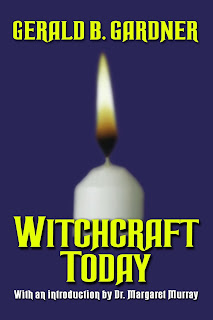This is a topic that has been discussed to no end in witchcraft circles, but there still seems to be some confusion about it, and I can see where some of it comes from. The terms Wicca and witchcraft are often used interchangeably, not least in older Wiccan literature.
In this article I will discuss some of these terms. and how they relate to each other. I do not profess to have the Ultimate Answer (TM), however, I will be basing this article off of academic work as well as that of reputable authors from the pagan field (some of which are the same). I would also like to point out that there is some confusion of terminology even among scholars in the area.
Let us begin.
Wicca & witchcraft
The terms Wicca and witchcraft are often confused with each other, especially among people who are familiar with neither concept. When I picked up a book called Wiccapedia a while back, I assumed that the name was a combination of the words Wicca and encyclopedia. Oh dear, how wrong I was. It was not an encyclopedia, and it had very little to do with Wicca, at least not in the way I have come to know it. This book, however, used the terms Wicca and witchcraft interchangeably as if they were the same thing. This is something that happens elsewhere as well, and something that I am also guilty of.So what is the difference then? What differentiated Wicca from witchcraft?
From an academic perspective witchcraft is, simply put, anything today or historically dealing with the practice of magic, anywhere in the world. That is to say: whether you practice folk magic, kitchen witchery of ceremonial magic, you are practicing witchcraft.
 |
| Gardner's Witchcraft Today, 1954 |
In the earliest works about Wicca, the term Wicca had not yet become widely used. Instead terms like "the old religion", "Witchcraft" or simply "the Craft" were used. Notice the difference in capitalization between Witchcraft and witchcraft. The former refers to a religious practice, and the latter to a general practice.
Wicca was and still is a religion based on witchcraft, and thus, to the early authors of books on the old religion, it would have been only natural. Look up some titles by Gardner and Doreen Valiente (the "mother of Wicca") and you will find the term Witchcraft widely used in them. This is a good thing to keep in mind while reading books by Wiccan authors: the terms used to be, and still sometimes are, used interchangeably.
The term Wicca became popular during the 1960s when the religion started to spread and split into different traditions, and it is now the most widely used name for the religion. A Wiccan is a practitioner of witchcraft, but all practitioners of witchcraft are not necessarily Wiccan.
Let us make a quick summary:
Wicca: a new witchcraft religion created in the mid 20th Century by Gerald Gardner, with roots in the western esoteric tradition, and the assumption of an unbroken continuance from a (since disproven) pre-Christian fertility religion that evolved into the so called witch-cult after Christianity took over. Wicca has evolved and developed a lot since its inception in the 1950s and has become a diverse religion with many traditions.
Witchcraft: the practice of a witch's craft, an umbrella term for different methods and practices.
Witch
What then, is a witch? Let us simply skip the caricature picture of the old wart-nosed hag stirring her cauldron. A witch, simply put, is someone who practices witchcraft. If we look back to the era of the witch-hunts, it was a term applied to both men and women equally, and in witchcraft circles it is considered a gender neutral term, even though popular media seems to want to differentiate between the genders (just look at Netflix's Sabrina-series where witchcraft-practitioners are pushed into different classes because of their assumed gender, into witches and warlocks, who supposedly own different power potentials).Before I go off on an other tangent, let us reiterate that the word witch is gender neutral and anyone practicing witchcraft is a witch. You do not, of course, have to call yourself a witch if you do not want to. Most countries have their own terms for practitioners of witchcraft.
***
Interesting to note is that, in my experience, these terms have become more widely discussed in recent times. Most books before this millennia seem to be more interested in discussing paganism than witchcraft, and that might have something to do with a few things:
 |
| The research pile just continued growing while writing this article. |
Thirdly, I think that instead of studying witchcraft, academics tend to keep to the topic of occultism. The occult handles esoteric thinking and theory, as well as magic(k), which is also a part of witchcraft. Witchcraft as it's own thing, however, is not being as widely studied, but it seems now to be a burgeoning field attracting new attention from academics.
Paganism, neo-paganism, occultism and western esotericism will have to require their own chapters. Thus I will end this chapter here, hoping you have gleaned some more clarity into these three terms. Questions can be posted below, or in my question box.
Sources
Berger, Helen A. (1999): Witches - Contemporary Neo-Paganism ans Witchcraft in the United StatesJohnston, Hannah E. & Peg Aloi (2007): The New Generation Witches - Teenage Witchcraft in Contemporary Culture
Pearson, Joanne (2007): Wicca and the Christian Heritage - Ritual, Sex and Magic
White, Ethan Doyle (2016): Wicca - History, Belief, and Community in Modern Pagan Witchcraft

No comments:
Post a Comment